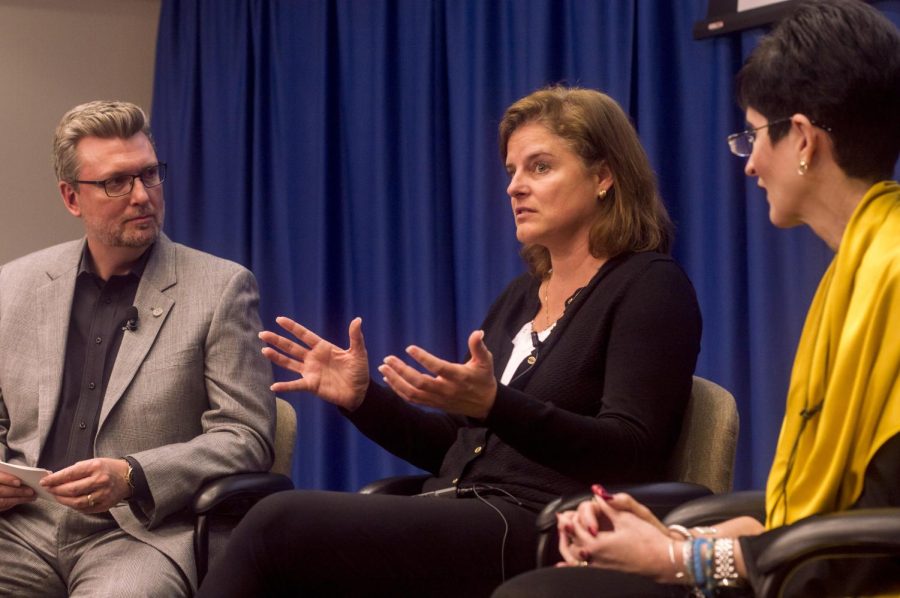JMC discusses public communication in fractious times
Guest speaker and Communications Director for Homeland Security Susan Phalen speaks during the JMC Convo: Navigating the Noise Thursday, Feb. 23. “I read a lot of outlets and triangulate news to navigate noise. We’re all sitting in this room but we see news differently,” Phalen said.
February 23, 2017
Communicating efficiently in times of crisis was the theme of the second panel conversation of the semester hosted by the school of Journalism and Mass Communication.
“A public communicator has to be very thoughtful, careful and precise,” said Stephanie Smith an assistant professor of JMC.
“Navigating the Noise: A JMC Conversation,” was hosted Thursday night by the School of Journalism in conjunction with the Student Voice Team, allowing students to learn how to discern bad noise from good noise.
Susan Phalen, communications director for the House Committee on Homeland Security, spoke on the panel with Smith a former senior intelligence service executive with the CIA. Thor Wasbotten, director of JMC, led the discussion.
Phalen and Smith share years of decorated global experience as well as professional experience in Washington, D.C. working for the U.S.1government. Both spoke of the rapidly changing communications field and the government’s difficulty keeping up.
“Government hasn’t done well at this for a long time,” Smith said. “They are straining and struggling at the pace of social media.”
Smith said the way government deals with certain situations and crisis events proves they cannot keep up with the information.
“Government’s response to terrorist organizations is slow and bureaucratic, ” Smith said. “We don’t understand anything except the attack that just happened.”
It isn’t just the government at fault for these missteps, but the media and the consumers as well. The public cannot go to one source for news all the time; research and investigation is required on the consumer’s part.
“Read a lot of outlets and triangulate news to navigate noise,” Phalen said. “We’re all sitting in this room but we see news differently.”
Finding accurate news can be hard, especially being surrounded by all the noise on social media. Brandon Bounds, sophomore journalism major, spoke during the event about how he personally finds credible sources in this digital age.
“Especially when it comes to politics,” Bounds said. “After I read articles on CNN or NPR, I do additional research.”
Ava Moss, a junior public relations major, said during the event that in addition to her research, she is hesitant to get her news solely off social media.
“When it comes to the comments (on social media posts),” Moss said. “We can get so swept up in those conversations that we forget why we came to the page in the first place.”
A possible root cause for these issues is the lack of media literacy being taught to younger generations.
“(Media literacy) starts way before college, it starts in the home,” Smith said. “It has to begin with discussion of contemporary events at the dinner table.”
Smith said that the surge in social media over the past decade has made navigating the noise more complicated. Since news is 24-hours-a-day, it’s easy to constantly go to the same outlet for information.
“You’re only getting a portion of the story if you limit yourself to one news outlet or one platform,” Smith said. “It requires you to go beyond the tweet or the posts on social media.”
As a public communicator, Phalen knows the difficulty of trying to engage a large audience. She said communicators must sharpen their message to be credible.
“There’s never a shortage of an audience,” Phalen said about communicating in times of crisis. “Fine tuning the message is what it comes down to.”
As radical news outlets emerge on both sides of the aisle, some sections of the public denounce certain websites as credible sources. However, Smith believes it isn’t the individual’s job to do that.
“We (as individuals) don’t get to legitimize news, we don’t hold that power,” Smith said. “People all over the world get to decide (and) it may not be people that I would ever personally legitimize.”
Both Phalen and Smith reminded the audience throughout the night that public communicators can best serve by being honest, being transparent and accepting of others viewpoints.
“Don’t deny yourself a front row seat to history just because you don’t like the players,” Smith said.
The school plans to host a follow-up discussion March 16 about media representation, which will be co-sponsored by the Kent State PRSSA chapter and the JMC Student Voice Team.
For more information, visit the JMC website.
Molly Spillman is the CCI reporter, contact her at [email protected].












